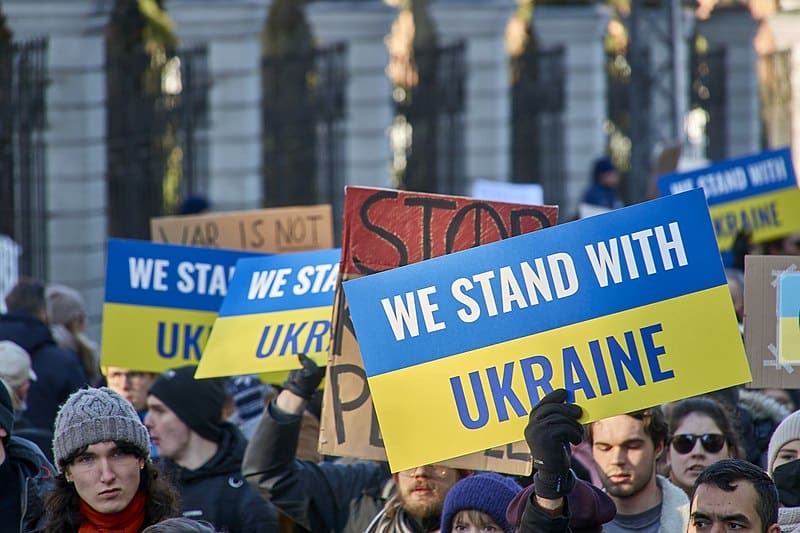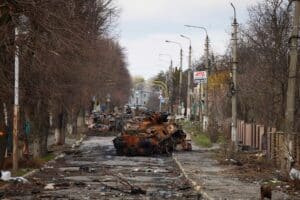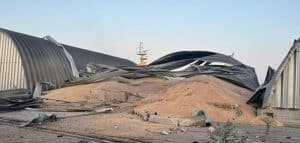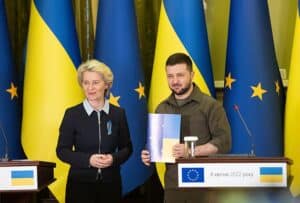Photo: Rally in support of Ukraine in February 2022 – Wikimedia Commons
Almost two years ago, Russia launched its full-scale invasion of Ukraine. With support for Ukraine no longer a foregone conclusion, a good outcome of the war is increasingly uncertain. The fighting smoulders on and the risk of another frozen conflict lurks. Support for Ukraine from the West thus remains undiminished in order to continue to undeniably convey that sovereignty, territorial integrity and independence are non-negotiable.
Latest developments
Figures are difficult to verify but according to US estimates, more than 70,000 Ukrainian and 120,000 Russian military personnel have been killed, in addition to more than 10,000 civilians (as of 24 February 2022). However, the war in Ukraine began back in 2014. It shows the huge toll of the Kremlin’s expansionism and historical revisionism.
Changes on the front have been very limited. Ukraine’s counter-offensive last summer failed to produce the intended results. Pieces of land along the east bank of the Dnieper were recaptured from the Russians with great difficulty, but a real breakthrough of the Russian defence line failed to materialise. Currently, many lives are being sacrificed in the battle for a few kilometres. Towns on the front line like Avdiivka and the now well-known Bakhmut are especially symbolically valuable. The now-destroyed towns are the boiling point of the confrontation between two powers handing out stings back and forth to each other. Russia is still attempting to take full control of the Luhansk and Donetsk regions, even if it costs thousands of lives for the few metres moved there. During the winter months, airstrikes regularly take place on cities and critical infrastructure far from the front, to show that the war is still a daily reality for a lot of Ukrainians.
Attention
Unjustifiably, international (media) attention to the war has waned in the past year. It is no longer of ‘current value’ to many and there are few major changes. However, the gravity of the situation on the ground has changed little since the time when there was still daily attention on the war. Every day, many people still find death, both military and civilians. Concerns in Ukraine about Western support are growing. The fear of entering a full-blown stalemate is becoming more real by the day. This, unfortunately, is something the country has already experienced and it knows what this would mean – namely that annexed territory will not return and Russia will again make a further claim on what is currently Ukrainian territory in the future.
Support
The current hesitation from the West will prolong the war and only increase the chances of Russian success. If support falters, it will provide a moral incentive for the Russian leadership to continue the conflict as it wishes. Besides, it is plausible that Putin’s hunger does not stop at Ukraine – as has been pointed out several times by neighbouring Baltic states. Providing military and financial support is thus not just about protecting Ukraine, it is about the security of the entire European continent. Some of Ukraine’s key partners realise this, such as France and Germany, but with its main partner – the US – support is at risk, as it is with EU member Hungary. In December, Orbán stopped a €50bn European aid package by vetoing it. Awareness of the risks posed by a losing Ukraine does not seem to resonate with all partners in the West. Shortly after the invasion, the West expressed its unconditional support, but the conflict continues longer than hoped and countries are no longer willing to express their support indefinitely. A right-wing wind is blowing through Europe and they see the war mainly as a waste of European money.
Internal tensions
Meanwhile, Ukraine also continues to face internal political tensions. Some discord between President Zelensky and Commander-in-Chief Zaluzhny, as a result of the failed counter-offensive, came to light late last year. After two years without major successes and growing war weariness, a scapegoat was sought. Zaluzhny mentioned in an interview with The Economist that the war had reached a “stalemate“. According to analysts, this would possibly imply that the time had come for talks with Russia. Zelensky reacted with outrage, calling such statements dangerous. The media picked up this disagreement as a potential crack in the unanimity of the Ukrainian top. In retrospect, these turned out to be purely magnified speculations. Consequently, few Ukrainians actually believed that there was serious disagreement and are instead convinced that both have the country’s best interests at heart. The vast majority of Ukrainians still have a positive view of the future, but the percentages are falling – 73% in December 2023 compared to 88% in October 2022. Sustained support is the only thing that can turn the tide and keep optimism and morale high.
Ukraine’s success depends on support from the West. With the risk of losing the US as a partner on this front after the autumn elections, European countries need to join forces and be able to guarantee support for Ukraine to ensure security on the continent and enable a strong Europe. As NATO Admiral Rob Bauer pointed out at a meeting in Brussels last week, this requires a different view of security. Words are not enough – financial and military support is all that matters.
Written by Timon Driessen



